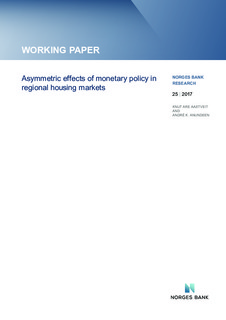Asymmetric effects of monetary policy in regional housing markets
Working paper
Published version
Permanent lenke
http://hdl.handle.net/11250/2494648Utgivelsesdato
2017Metadata
Vis full innførselSamlinger
Sammendrag
The responsiveness of house prices to monetary policy shocks depends both on the nature of the shock – expansionary versus contractionary – and on city-specific housing supply elasticities. We test and find supporting evidence for the hypothesis that expansionary monetary policy shocks have a larger impact on house prices when supply elasticities are low on 263 US metropolitan areas. We also test whether contractionary shocks are orthogonal to supply elasticities, as implied by downward rigidity of housing supply, and find supporting evidence. A final theoretical conjecture is that contractionary shocks should have a greater impact on house prices than expansionary shocks, as long as supply is not perfectly inelastic. For areas with high housing supply elasticity, our results are in line with this conjecture. However, for areas with an inelastic housing supply, we find that expansionary shocks have a greater impact on house prices than contractionary shocks. We provide evidence that this is related to a momentum effect that is more pronounced when house prices are increasing than when they are falling.

